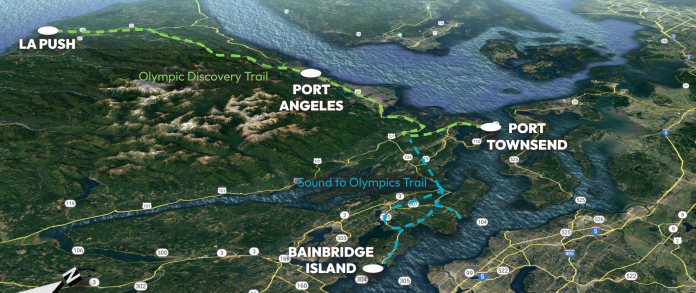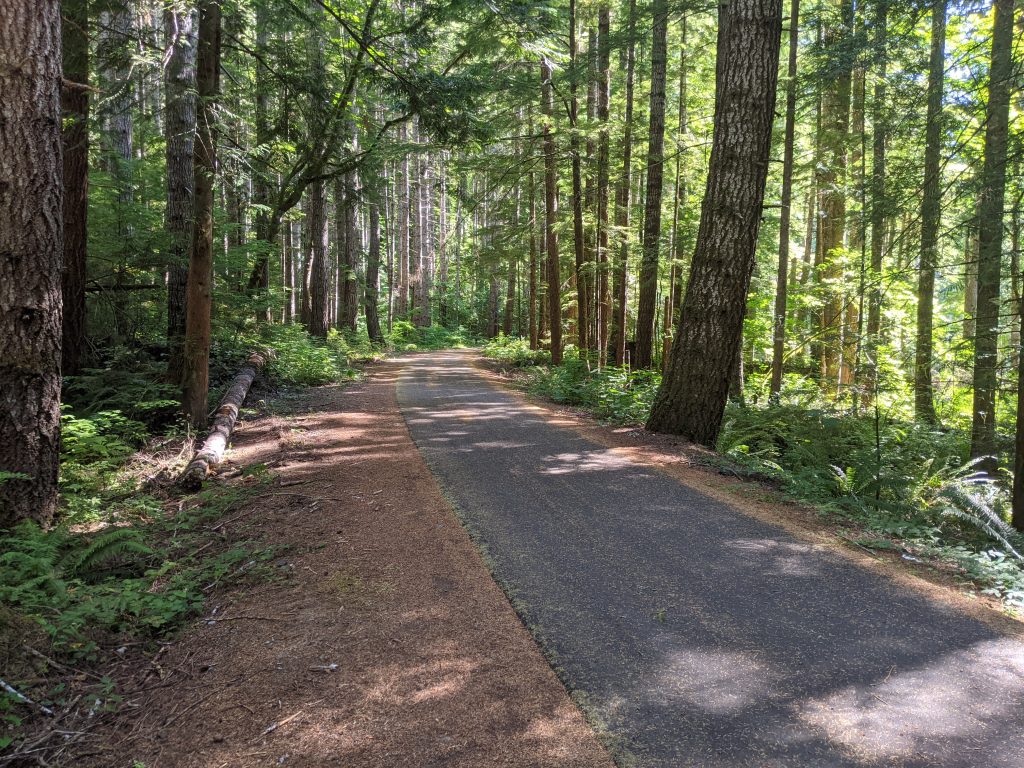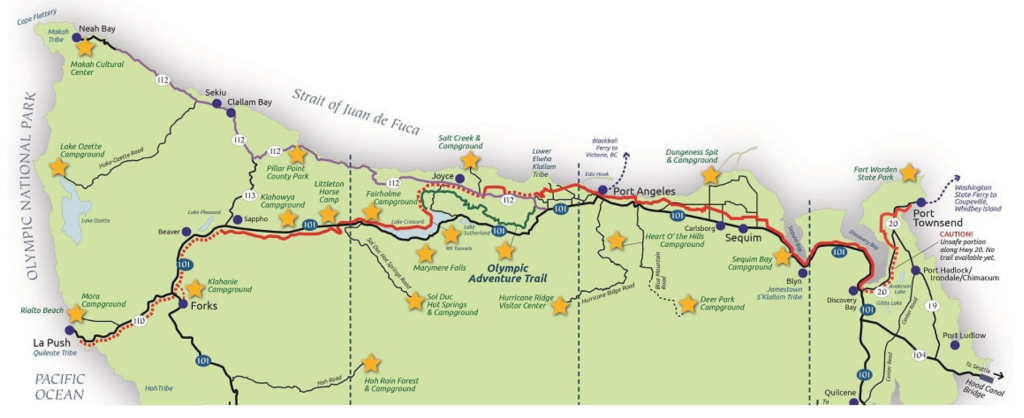
An impressively long list of governments on the Kitsap and Olympic peninsulas have joined together to jointly request funding to finish a 200-mile biking and walking trail that will connect the Pacific Ocean to Puget Sound. The request for funds from the U.S. Department of Transportation will close around 100 miles of gaps in regional trails that, if completed, would allow uninterrupted cycling and hiking from the Bainbridge Island ferry terminal all the way to the beach in La Push.
The request, submitted as part of the Rebuilding American Infrastructure with Sustainability and Equity (RAISE) grant program, has the city of Port Angeles as its lead applicant, with five other cities, three counties, the Port of Port Townsend, the Quileute and Suquamish tribes, and the Washington State Department of Transportation (WSDOT) joining in the request to receive funding.
Filling the gaps would unite two separate regional trails on either side of the Hood Canal Bridge: the Olympic Discovery trail in Jefferson and Clallam Counties, and the Sound to Olympics trail in Kitsap County. If awarded, the $16.2 million request would fund planning and design on 34 separate segments to create a single trail that is being called the Puget Sound to Pacific Trail (PS2P).

The Puget Sound to Pacific Collaborative is an initiative of three nonprofit groups, the Bainbridge Island Parks & Trails Foundation, the North Kitsap Trails Association, and the Peninsula Trails Coalition, is bringing the governments together to request funding from the RAISE program, which is unique in that it does not require a local match. The collaborative’s director is Steve Durrant, a landscape architect specializing in active transportation projects.
“PS2P will provide nonmotorized access routes to destinations including the Pacific Coast and Olympic National Park for the more than 4 million people in the Seattle metropolitan area and visitors, who are just a ferry ride away from the beginning of the trail,” Durrant said in an announcement touting the application. “The completed PS2P will provide more opportunities for the health of children, underserved populations and the general public to have active lifestyles with safe and convenient active transportation infrastructure where few connected routes currently exist.”
By creating a full connection between the relatively rural population centers along the route, 90% of the population would be within three miles of being able to access a segment of the trail. “The trail segments are part of a larger cross-country and statewide trail network that enables a non-motorized tourist to travel from Seattle across Bainbridge Island, and the Kitsap and Olympic Peninsulas to the Pacific Coast over approximately 200 miles,” the grant application states.

The applicants have lined up a long list of supporters around the state pushing for the full trail’s completion. “This multi-use trail project will be an asset not just to the many counties, small towns and reservations, directly served, but also to the wider state of Washington,” Washington’s Commissioner of Public Lands, Hilary Franz, wrote in a letter of support to USDOT Secretary Pete Buttigieg.
“It’s our opinion that the physical boundaries that separate groups in the greater Seattle metro area are being made less significant by initiatives like this one, whereby residents will be able to easily and safely access the surrounding townships, parks, and recreation,” Jason Marqusee, the co-owner of Good Weather bike shop and restaurant in Seattle, wrote in a letter of support. “This is good for everyone; tourism grows, commerce is diversified and disseminated to new regions, and this area of the country can continue to grow in a healthy, desirable way.”
If the grant were awarded this year, cities and other jurisdictions (including tribes) along the route would be able to advance segments of the trail to different levels of planning and design, including bringing some up to 100% design-ready to put out to bid. The march to advance each segment has been carefully planned out by the coalition to meet the 2032 deadline for full expenditure, and so that is when riders would expect to see most of these segments completed.
Completing the missing links in the trail would also bring substantial benefits to local jurisdictions trying to improve mobility in their own communities. Bainbridge Island, where over five miles of new trail would be built, is focusing heavily on expanding its walking and biking network. This would expand the single mile of the Sound to Olympics Trail constructed on the island now. With a dedicated vehicle license fee going to active transportation projects across the island to create the spine of a trail running alongside State Route 509, the additional funding would pay dividends for the city’s trail network.

“Trails are touchpoints to so many of our values and goals – sustainability and connectivity, recreation and community health, climate resilience, preservation of our natural lands,” said Mary Meier, executive director of the Bainbridge Island Parks & Trails Foundation, following the application’s filing. “Even as we plan the [Sound to Olympics trail] across Bainbridge Island, it feels monumental to be part of this much larger, regional trail planning effort, alongside so many other communities.”
Awards for the RAISE grant program are expected by the end of June. President Biden’s 2024 proposed budget for USDOT includes an additional $60 million for the new active transportation investment program, a relatively puny amount for the entire nation but a potential source of additional construction funds for trail segments like the PS2P. Along with potential opportunities for regional grants, being awarded the RAISE grant would well position many governments in Western Washington to turn this vision into a reality. If it all comes together, it could be truly transformative for the entire state.
Correction: A previous version of this article incorrectly listed Port Orchard, not Port Angeles, as the lead applicant on the RAISE grant.
Ryan Packer has been writing for The Urbanist since 2015, and currently reports full-time as Contributing Editor. Their beats are transportation, land use, public space, traffic safety, and obscure community meetings. Packer has also reported for other regional outlets including Capitol Hill Seattle, BikePortland, Seattle Met, and PubliCola. They live in the Capitol Hill neighborhood of Seattle.


